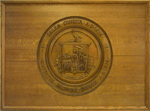Salem Witch Trials: Difference between revisions
No edit summary |
No edit summary |
||
| Line 23: | Line 23: | ||
==See Also== | ==See Also== | ||
Vertical File in Salem Collection - ''' | Vertical File in Salem Collection - '''Witchcraft''' | ||
Vertical File in Salem Collection - '''Witchcraft Trials - 1692''' | Vertical File in Salem Collection - '''Witchcraft Trials - 1692''' | ||
Revision as of 12:23, 9 March 2018
- The Salem Witch hysteria and trials took place in 1692 in what is now the cities of Danvers, Salem, Beverly and Topsfield. It started with young girls (one a minister's daughter) falling into uncontrollable fits, claiming to be possessed by witches. By the end, 19 people had been hung and 1 man had been pressed to death.
- The location of the hangings was made official in Jan. 2106 by the Gallows Hill Project, a group of seven scholars who announced that they were definitely certain the location is Proctor's Ledge, a wooded, city-owned area that abuts Proctor and Pope Streets.
- Eventually, hundreds of residents were accused of witchcraft and more than 100 were arrested.
- The Witch House (310 Essex St.) in Salem was the home of Judge Jonathan Corwin, know as the Witch Trial Judge.
- In 1711, all the accused were exonerated and their relatives offered retribution. But, whether out of fear or shame, not all the families came forward to accept the apology. So on Nov. 1, 2001, acting governor Jane Swift approved a bill that cleared the five not cleared in the previous amnesty resolutions- Susannah Martin, Bridget Bishop, Alice Parker, Margaret Scott and Wilmot Redd.
- Many primary source documents can be viewed and studied at the Phillips Library of Peabody Essex Museum. They own the court records of the special 1692 Court of Oyer and Terminer, more commonly known as the Witchraft Trials.
- Both the Salem Witch Trials Memorial (adjacent to Charter St. Cemetery) and the Witch Trial Memorial Statue by Salem sculptor Stefanakis commemorate this event in Salem's history.
- For in-depth research, court records, maps and analysis of these happenings, consult the websites below.
- Salem celebrated its Tercentenary of the Witch Trials in the year 1992, with many educational events and the dedication of the Salem Witch Trials Memorial.
- In Danvers you may visit the Rebbeca Nurse Homestead and the Salem Village Witchcraft Victims' Memorial at Danvers (finished for the Tercentenary in 1992.)
- For more about Rebecca Nurse see this wiki entry Rebecca Nurse.
- For theories on the possibility of a type of food poisoning called ergotism (through rye meal), as an explanation of the outbreaks, see the book below, Ergot and the Salem Witchcraft Affair.
See Also
Vertical File in Salem Collection - Witchcraft
Vertical File in Salem Collection - Witchcraft Trials - 1692
Vertical File in Salem Collection - Witchcraft - Ergotism (Poison theory of Witchcraft Hysteria)
Salem Witch Trials Documentary archive by the University of Virginia.
Salem Witchcraft Papers by U. of Virginia
Salem Witchcraft Trials, 1692 by U. of Kansas-City, School of Law.
Danvers Archival Center A collection of materials relating to Salem Village witchcraft era housed in Peabody Institute Library, Danvers, Mass.
Ergot and the Salem Witchcraft Affair M. Matossian
Salem possessed: the social origins of witchcraft Boyer, P. and Nissenbaum, S.
The witches: Salem, 1692 by Stacy Schiff
A delusion on Satan: the full story of the Salem Witch Trials F. Hill
The Devil in Massachusetts: a modern enquiry into the Salem witch trials M. Starkey
Salem witch trials: a day-by-day chronicle of a community under siege Marilynne K. Roach
"Ground Zero: Proctor's Ledge confirmed as witch-execution site" Salem News, Jan. 12, 2016, p. 1
Salem Witch Museum Salem Witch Museum
Salem Witch Trials Pathfinder Research Guide
